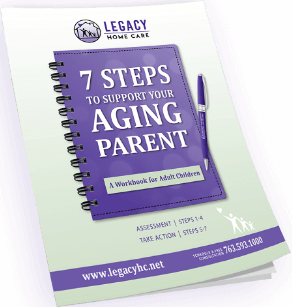Alzheimer’s is an irreversible disease that causes one to have memory loss which can result in not being able to perform basic day-to-day tasks. This can be a scary situation for both the person suffering from the disease, as well as his or her family members.
In order to communicate more effectively with the person, it’s important to understand Alzheimer’s and the process.
There are 3 stages in Alzheimer’s – early, middle and late.
The early stage is when the person is functioning independently, but is starting to have memory lapses. Friends and family start noticing difficulties, such as coming up with the right word or name for a familiar object, challenges performing tasks in social or work settings, losing or misplacing a valuable object, or increasing trouble with planning and organizing.
The middle stage is when the dementia symptoms are more pronounced. A person may have greater difficulty performing tasks, such as paying bills, but they may still remember significant details about their life.
In the final stage of the disease, dementia symptoms are severe. Individuals lose the ability to respond to their environment, to carry on a conversation and, eventually, to control movement. They may still say words or phrases, but communicating pain becomes difficult. As memory and cognitive skills continue to worsen, significant personality changes may take place and individuals need extensive help with daily activities.
It is important to be patient and kind with Alzheimer’s sufferers at all stages, as they are going through a lot of adjustments and need stability and support.
Here are three ways to improve your conversations and alleviate stress and frustration while adjusting to this “new normal:”
- Don’t make assumptions regarding a person’s ability to communicate. Alzheimer’s affects everyone differently.
Alzheimer’s runs at a different pace for everyone. Some people are able to communicate and be more present for a longer time than most. It all depends on the person and how severe the situation is.
- Don’t exclude the person out of any conversation just because of their diagnosis
- Communicate directly to the person rather than communicating through their caregiver
- Give the person time to understand and form a response; don’t rush them or interrupt
- Figure out what type of communication is easiest:
- In person
- Writing
- Phone calls
- It’s ok to have a good time and laugh – this will lighten the mood
- Don’t become distant. They are still the same person they were before they were diagnosed with Alzheimer’s
- Make an effort to patiently communicate with the person without getting frustrated or upset
- Be in a quiet area where there are no other distractions
- Maintain eye contact
- Ask questions that are yes or no. They are easier to answer. For example, ask “Would you like to go for a walk?” versus “What would you like to do?”
- Speak slowly with patience
- Avoid arguing and disagreeing
- When communication becomes too difficult, use the practice of writing notes
- Communicate with the person using verbal and nonverbal communication
As Alzheimer’s progressively gets worse you may need to communicate differently with the person compared to the first stages. Here are some tips in order to make the communication process easier:
- Identify yourself to the person with your name and who you are
- If the person does not understand you verbally, use nonverbal communication, such as pointing to a glass of water and asking, “do you want this?”
- Avoid treating the person as a job for you. They still have feelings and want respect
Source: “Communication and Alzheimer’s” from Alzheimer’s Association




Signs That Your Loved One Requires Home Care
Difficulty Driving Older adults and driving can be a complicated…